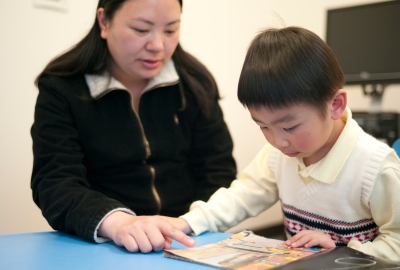
Reading Readiness & Authentic Assessment
Through the use of authentic assessments, educators are able to collect and reflect on information about how children perform in routine activities. This project is a means of providing support to prekindergarten teachers in their use of authentic assessment, especially in the areas of reading readiness, via a coaching-hotline. Additionally, as part of the project, the team holds regular events focusing on using authentic assessment data to inform reading readiness instruction – helping pre-k teachers assess and instruct in domains such as language, literacy, and social emotional development - which are essential to a child’s future success with reading and school readiness.
Civic Engagement- Early Childhood
Are there early childhood developmental competencies that predict later civic behavior for low-income, diverse children and youth? Can early childhood settings provide unique opportunities for engagement in activities, which serve to facilitate and encourage prerequisites for later civic involvement? That is, what is the developmental foundation of civic engagement? These questions are being explored using data from the Early Childhood Longitudinal Study-Kindergarten (ECLS-K). Currently, this project is in the analysis and dissemination phase.
Civic Engagement - Adolescence and Emerging Adulthood
These projects explore how diverse populations of adolescents and young adults in New York and Paris think of citizenship, voting, and volunteering. All projects explore gender, ethnic, and socioeconomic differences. Topics include the effects of context, the importance of various political issues, the effect of multiethnic identity, and how system justification, evaluation of women's and immigrants' rights, political orientation, and (in one sample of college students) whether parents/caretakers went to college affect whether and how civic engagement is expressed.
Civic Engagement - Adults
One project explores how parents in France socialize their children into civic engagement. Another is an interview study of how Muslim women who teach in New York City think about their family and cultural backgrounds, career choices, religion, and the role of teachers in fostering students' civic engagement. The final project is a study of NYC public school social studies teachers: what they think about civic engagement in the curriculum, whether and how they teach it, and (in follow-up interviews) whether they consider teaching itself a form of civic engagement. Intermediate-level in French is required to work with the interview data from France.
Young Children & Opportunities for Play in Early Education Contexts
Data from the Early Childhood Time-Use in Schools Profile (ECTUS-P) is used to explore how, why and what type of classroom-based activities kindergarten children engage in, with a particular focus on how assessment time and accountability practices shape these experiences. Currently, this project is in the analysis and dissemination phase.
Trajectories to Success
What are the Service Pathways for Young Children in Immigrant Families? Using data from randomized samples of low-income, immigrant families, this project aims to identify and evaluate the varying service pathways for immigrant families with young children. For example, when do immigrant families utilize and benefit from early intervention services? This project is in the data collection phase.
Social Studies Curriculum in Urban Kindergarten Classrooms: An Opportunity for Theory and Measure Development
Social studies frameworks aim to prepare students for citizenship and civic engagement, yet there is no empirical evidence suggesting that such investments are a worthy goal. Kindergarten teachers in NYC public schools were asked guiding questions to explore the implementation of a civic-focused curriculum, document teacher’s views of children as developing citizens, and develop a Measure of Early Childhood Civic Engagement (MECCE). The following questions guide this study 1) How do kindergarten teachers implement, use and understand the civic-focused social studies curriculum and related benchmark items? (2) What are teacher’s views of children as emerging citizens? Study Two, Developing a Measure of Civic Engagement for Urban Children Living in Low-Income Contexts will utilize benchmark indicators from the state curriculum to develop and pilot the An additional component of this work will be to develop a measure of civic engagement for urban children living in low-income contexts. We will utilize benchmark indicators from the state curriculum to develop and pilot the MECCE.
Together these studies will expand our understanding of the development of civic engagement for young children; deepen our knowledge of teacher’s perceptions of emerging citizens; document the implementation of civics in kindergarten where high-stakes practices for other areas are pressing and, develop the first teacher-report measure of civic engagement for kindergarten children (MECCE) by adapting and expanding items from the NYC Social Studies Practices curriculum. This project is funded by the Spencer Foundation New Civics Initiative. Currently, this project is in the data collection and analysis phase.
Evaluating Inquiry-Based Professional Development Initiative in an Urban Context
playLabNYU partnered with faculty from the Teacher Education Department at the Borough of Manhattan Community College to lead the evaluation of an innovative three-year professional development initiative aimed to support educators in implementing child-centered and inquiry-based practices across pre-k through fifth grade in a public school in West Harlem. This project is funded by the Kellogg Foundation.

